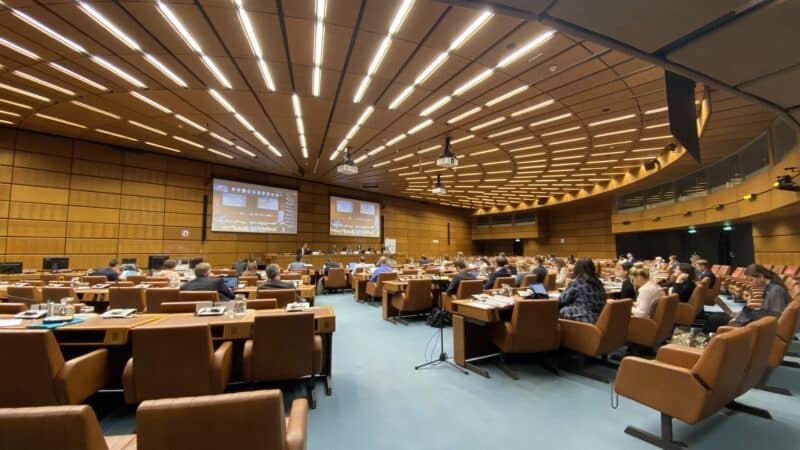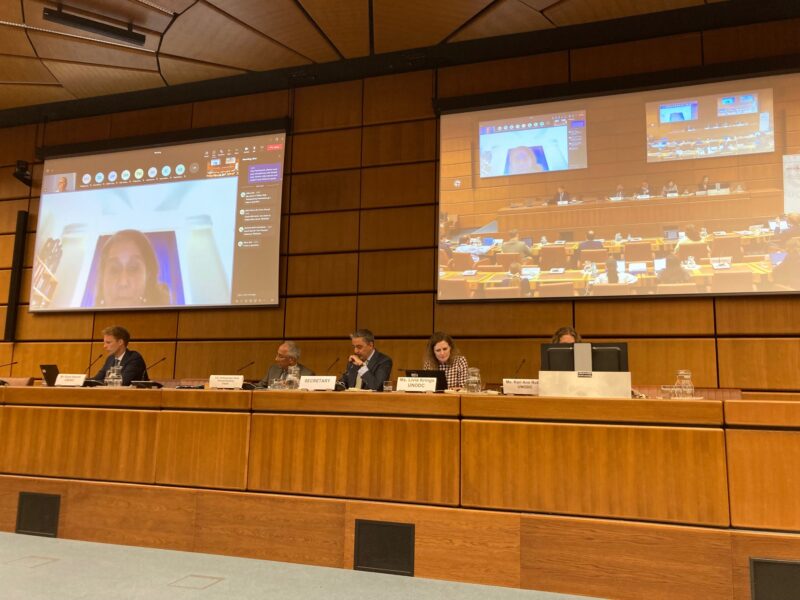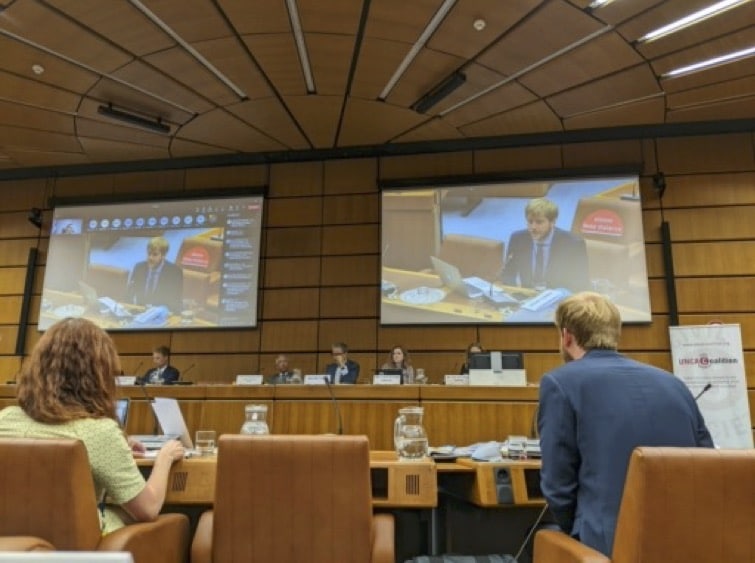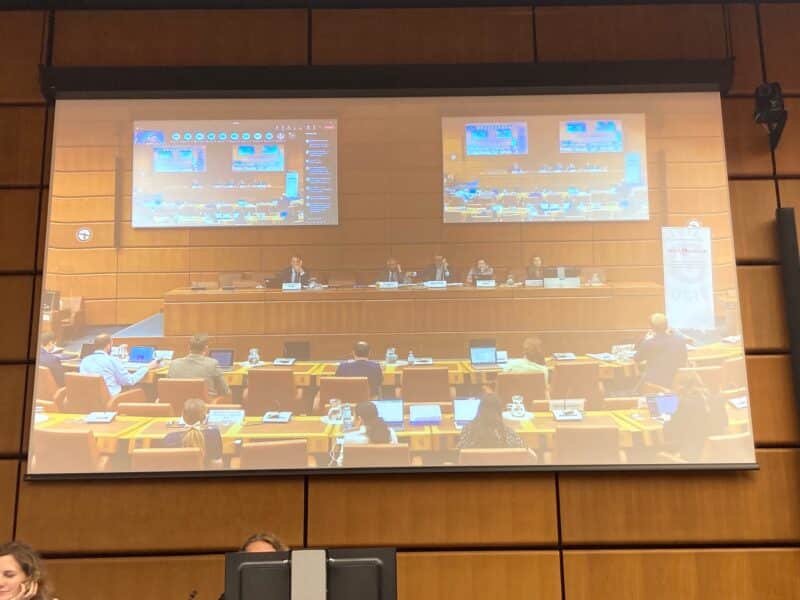24 July 2022 –
This year’s NGO briefing on the margins of the 13th session of the Implementation Review Group (IRG) was met with wide interest from many different stakeholders who engaged with UNODC officials and posed important questions. Representatives from 11 States Parties and 10 CSOs (UNCAC Coalition, OCP, GI-TOC, GOPAC, TI Austria, MCIC, NGO Alliance, Libyan Transparency Association, MJAFT! Movement, Partners for Transparency) attended the briefing in person, and there were over 60 online attendees, including many representatives of UNCAC Coalition member organizations.
UNODC’s presentation of their thematic report on the implementation of Chapter II of the UNCAC revealed that in 58 executive summaries and country review reports, the main challenges related to Articles 7 and 11 (public sector and measures relating to the judiciary, respectively), and the main good practices were found in Articles 5 and 13 of the UNCAC (preventive anti-corruption policies and practices and participation of society, respectively). However, the UNCAC Coalition and others highlighted that the latter does not reflect the reality of ever-increasing restrictions to civic space in anti-corruption issues on the ground. Gillian Dell, Head of Conventions at Transparency International (TI) and Vice-Chair of the UNCAC Coalition, raised an important question related to the absence of UNGASS commitments in the thematic report.
- Statement delivered by Gillian Dell (.pdf) during the NGO briefing

NGO briefing 2022



The UNCAC Secretariat highlighted that information on the follow-up to CoSP resolutions, and particularly concerning the UNGASS provisions, are provided by States Parties on a voluntary basis and that it hopes to receive such details in the future.
The Impact of Covid-19 on the IRM
The UNCAC Secretariat underlined the unpredictable role that the Covid-19 pandemic played in the review process in the annual briefing on the performance of the UNCAC Implementation Review Mechanism (IRM). Significant delays occurred as country visits could not take place until late 2021; Some 5% of States Parties have not yet nominated a focal point and over 43 States Parties have not yet submitted their responses to the self-assessment checklists. Only 87 country visits and dialogues have taken place in the second review cycle, as opposed to 175 in the first cycle.
All of these factors obstruct the continuation of country reviews, as well as the completion of the second cycle by June 2024. Mathias Huter, Managing Director of the UNCAC Coalition and Gillian Dell from TI inquired about the future of the review mechanism and how civil society would be included in discussions. The UNCAC Secretariat highlighted that States Parties have yet to decide on whether to further extend the second cycle (scheduled to end in 2024). Based on these delays, it appears likely that the current cycle will be prolonged until December 2025.
Technical Assistance Delivery and Initiatives
The UNCAC Secretariat reported that more than one-third of States Parties noted the benefits of sharing experiences and good practices in addressing technical assistance needs through bilateral cooperation. This support has helped 70% of countries in creating action plans or informal mechanisms to follow-up on recommendations arising from country reviews.
One of the key initiatives for technical assistance delivery includes the creation of new regional anti-corruption hubs, which will provide regionally tailored expertise needed to service regional requests. Another is the Global Resource for Anti-Corruption Education and Youth Empowerment (GRACE) Initiative, which further promotes the role of education and youth empowerment in preventing and countering corruption. This complements existing integrity and education programs in the private sector, such as the Global Integrity Education Program. The last initiative that was launched is the GlobE Network, a platform for the global information exchange between anti-corruption law enforcement practitioners, whose 2022 work plan will be adopted soon, the UNCAC Secretariat highlighted. In 2023, UNODC is planning to develop training modules to improve cooperation between Supreme Audit institutions and anti-corruption bodies.
More transparency in the IRM?
Closing statements from NGOs and States Parties overwhelmingly underscored the need for more transparency and accountability in the UNCAC IRM. Gillian Dell called attention to the importance for CSOs to have observer status in the CoSP subsidiary bodies, as well as for the objections process on the participation of NGOs in the CoSP to be resolved. Mathias Huter also echoed this sentiment by calling for the constructive contribution and engagement of civil society in UNCAC country reviews and follow-up processes through civil society parallel reports. To increase transparency and support civil society participation, he highlighted the recent work of the UNCAC Coalition, in particular the UNCAC Review Status Tracker, the Transparency Pledge, and the Access to Information Campaign. The United States highlighted the need to improve the transparency and inclusivity of future NGO briefings and working group meetings through active in-person and virtual participation.
Context
The annual NGO briefing is the only formal opportunity for civil society representatives to engage with the UNCAC Secretariat (UNODC) and representatives of States Parties in-between sessions of the UNCAC Conference of the States Parties: NGO representatives can pose questions to the UNCAC Secretariat, highlight their UNCAC-related work, as well as general findings and concerns, and engage with participating representatives of States Parties. During the briefing, the Secretariat will brief participants on the UNCAC review mechanism and on thematic reports on the implementation of the Convention. In line with UNCAC CoSP resolution 4/6, no specific country situations can be discussed during the briefing.



